26 feb 2019
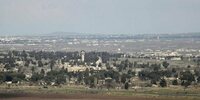
The UN has been adopting resolutions condemning the Israeli occupation of the Golan Heights for decades; however, Tel Aviv hasn’t changed its policies and is continuing to exercise sovereignty over the disputed territory, including holding municipal elections.
Secretary-General of the UN Antonio Guterres has presented a report to the UN Human Rights Council based on Syrian accusations against Israel’s action in the Golan Heights, saying that Israel has been burying “nuclear waste with radioactive content in 20 different areas populated by Syrian citizens” in the occupied territory.
Most of the waste has allegedly been dumped in the area near Al-Sheikh Mountain.
According to the report, this puts “the lives and health of Syrians in the occupied Syrian Golan in jeopardy” and violates the 4th Geneva Convention.
Israel is suspected of possessing nuclear weapons, but no evidence proving or disproving the suspicion has been presented so far. Tel Aviv has neither officially confirmed, nor denied possessing nuclear weapons.
The Golan Heights was seized by Israel from Syria during the Six-Day War, in 1967. In 1981, Tel Aviv decided to extend its laws to the occupied territory and established a civil administration in a move that drew condemnation from the UN Security Council and was labelled illegal, in terms of international law.
Israel justified the decision by saying that it was aimed at safeguarding its borders from aggressive military acts by its neighbours.
PNN further reports that, in 2018, the UN General Assembly adopted a resolution urging Israel to immediately withdraw its forces from the Golan Heights after Tel Aviv organised local elections in the Golan Heights, on 30 October.
Secretary-General of the UN Antonio Guterres has presented a report to the UN Human Rights Council based on Syrian accusations against Israel’s action in the Golan Heights, saying that Israel has been burying “nuclear waste with radioactive content in 20 different areas populated by Syrian citizens” in the occupied territory.
Most of the waste has allegedly been dumped in the area near Al-Sheikh Mountain.
According to the report, this puts “the lives and health of Syrians in the occupied Syrian Golan in jeopardy” and violates the 4th Geneva Convention.
Israel is suspected of possessing nuclear weapons, but no evidence proving or disproving the suspicion has been presented so far. Tel Aviv has neither officially confirmed, nor denied possessing nuclear weapons.
The Golan Heights was seized by Israel from Syria during the Six-Day War, in 1967. In 1981, Tel Aviv decided to extend its laws to the occupied territory and established a civil administration in a move that drew condemnation from the UN Security Council and was labelled illegal, in terms of international law.
Israel justified the decision by saying that it was aimed at safeguarding its borders from aggressive military acts by its neighbours.
PNN further reports that, in 2018, the UN General Assembly adopted a resolution urging Israel to immediately withdraw its forces from the Golan Heights after Tel Aviv organised local elections in the Golan Heights, on 30 October.
12 feb 2019
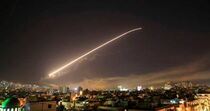
The Israeli army targeted late Monday a hospital and an observation post with tank shells in Quneitra south of Syria, state media reported.
According to Syria-run SANA news agency, Israeli tank shells targeted a hospital in Quneitra and a nearby observation post, causing material damage.
The Israeli military did not respond to the report till time of writing.
Anatolia news agency also reported that Israeli army also shelled Hizbuallah posts in the town.
According to Israeli army, more than two hundreds of airstrikes were carried out in Syria over the past two years.
According to Syria-run SANA news agency, Israeli tank shells targeted a hospital in Quneitra and a nearby observation post, causing material damage.
The Israeli military did not respond to the report till time of writing.
Anatolia news agency also reported that Israeli army also shelled Hizbuallah posts in the town.
According to Israeli army, more than two hundreds of airstrikes were carried out in Syria over the past two years.
8 feb 2019
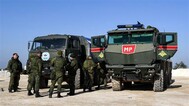
Russian military police forces stand outside armored troop transports in the village of Arima, west of the northern Syrian town of Manbij, on January 12, 2019
Russia’s Foreign Ministry objects to Israel’s airstrikes on Syria, calling for an end to the “arbitrary” Israeli attacks on the country.
“As for recent Israeli strikes, we have stated that such arbitrary attacks on a sovereign state must stop,” said Russian Deputy Foreign Minister Sergei Vershinin, apparently referring to Israeli airstrikes against Syria in January, Russia’s TASS news agency reported on Friday.
“Any attacks additionally worsen the situation,” the Russian diplomat said, adding that, “No one’s actions in Syria can go beyond the fight against terrorists.”
Israel often claims that it conducts airstrikes targeting “Iranian assets” in Syria. Iran and Russia are both Syrian government allies but merely have military advisers in the Arab country to help it fight a terrorist campaign that is largely subdued. Russia has also conducted aerial bombings of terrorist positions.
In mid-January, the chief commander of the Islamic Revolution Guards Corps (IRGC) also said Iran would protect its advisers in Syria.
Last September, a Russian Il-20 reconnaissance aircraft was shot down and all the 15 servicemen on board were killed during Israeli airstrikes in the northwestern Syrian province of Latakia.
Moscow said the Tel Aviv regime was fully responsible for the incident and started procuring Russian S-300 missile defense systems for Syria.
The comments by Vershinin, the Russian deputy foreign minister, echoed statements made earlier by Russia’s Ambassador to Israel Anatoly Viktorov.
An Israeli satellite imaging company recently indicated that the Russian S-300 missiles in Syria had become operational.
Russia’s Foreign Ministry objects to Israel’s airstrikes on Syria, calling for an end to the “arbitrary” Israeli attacks on the country.
“As for recent Israeli strikes, we have stated that such arbitrary attacks on a sovereign state must stop,” said Russian Deputy Foreign Minister Sergei Vershinin, apparently referring to Israeli airstrikes against Syria in January, Russia’s TASS news agency reported on Friday.
“Any attacks additionally worsen the situation,” the Russian diplomat said, adding that, “No one’s actions in Syria can go beyond the fight against terrorists.”
Israel often claims that it conducts airstrikes targeting “Iranian assets” in Syria. Iran and Russia are both Syrian government allies but merely have military advisers in the Arab country to help it fight a terrorist campaign that is largely subdued. Russia has also conducted aerial bombings of terrorist positions.
In mid-January, the chief commander of the Islamic Revolution Guards Corps (IRGC) also said Iran would protect its advisers in Syria.
Last September, a Russian Il-20 reconnaissance aircraft was shot down and all the 15 servicemen on board were killed during Israeli airstrikes in the northwestern Syrian province of Latakia.
Moscow said the Tel Aviv regime was fully responsible for the incident and started procuring Russian S-300 missile defense systems for Syria.
The comments by Vershinin, the Russian deputy foreign minister, echoed statements made earlier by Russia’s Ambassador to Israel Anatoly Viktorov.
An Israeli satellite imaging company recently indicated that the Russian S-300 missiles in Syria had become operational.
1 feb 2019
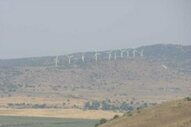
Al-Marsad has published a new legal report that investigates the implications of a recent Israeli project which proposes to develop a massive wind farm in the occupied Syrian Golan (‘Golan’).
The report highlights the consequences of Israel’s latest attempt to tie itself to the Golan by stealing the region’s resources and manipulating its native population.
Although the report focuses on one specific project, it identifies many of the common characteristics of settlement businesses, in the Golan, which violate international law and harm the native community immensely.
Windfall – The Exploitation of Wind Energy in the Occupied Syrian Golan investigates Energix Renewable Energies’ Clean Wind Energy Project. The project seeks to build at least 52 wind turbines across much of the limited remaining Syrian owned land in the Golan.
Energix is an Israeli company and is working collectively with the Israeli government to advance the project. Energix has sought to execute the project through a number of concerning practices, including fraud and misrepresentations, and has possibly engaged in widespread corruption.
According to the PNN, the report starts by exploring Energix’s project and its actions in the native Syrian community. Next, the report discusses how Energix is violating numerous principles of corporate social responsibility in advancing the project.
Lastly, the report shows how the project, like the majority of Israeli sponsored business development plans in the Golan, violates fundamental principles of international law. The report concludes by identifying how the project is simply a tool for Israel to tighten its illegal grip on the Golan to profit Israelis and Israeli settlements at the expense of the local Syrian community.
With no end in sight to the occupation, Al-Marsad seeks to uphold basic international laws and standards in the region. It therefore rejects and will continue to contest Energix’s and Israel’s actions in the Golan. Syrians must have the final say in what happens with Syrian natural resources on Syrian land.
Click here to view full report. [pdf]
The report highlights the consequences of Israel’s latest attempt to tie itself to the Golan by stealing the region’s resources and manipulating its native population.
Although the report focuses on one specific project, it identifies many of the common characteristics of settlement businesses, in the Golan, which violate international law and harm the native community immensely.
Windfall – The Exploitation of Wind Energy in the Occupied Syrian Golan investigates Energix Renewable Energies’ Clean Wind Energy Project. The project seeks to build at least 52 wind turbines across much of the limited remaining Syrian owned land in the Golan.
Energix is an Israeli company and is working collectively with the Israeli government to advance the project. Energix has sought to execute the project through a number of concerning practices, including fraud and misrepresentations, and has possibly engaged in widespread corruption.
According to the PNN, the report starts by exploring Energix’s project and its actions in the native Syrian community. Next, the report discusses how Energix is violating numerous principles of corporate social responsibility in advancing the project.
Lastly, the report shows how the project, like the majority of Israeli sponsored business development plans in the Golan, violates fundamental principles of international law. The report concludes by identifying how the project is simply a tool for Israel to tighten its illegal grip on the Golan to profit Israelis and Israeli settlements at the expense of the local Syrian community.
With no end in sight to the occupation, Al-Marsad seeks to uphold basic international laws and standards in the region. It therefore rejects and will continue to contest Energix’s and Israel’s actions in the Golan. Syrians must have the final say in what happens with Syrian natural resources on Syrian land.
Click here to view full report. [pdf]
24 jan 2019
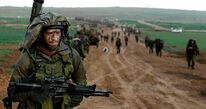
A shooting attack from Syria was allegedly carried out against Israeli military patrols stationed near the Syrian borders, the Israeli army spokesman claimed on Thursday.
The Hebrew-speaking Walla news site claimed that the Israeli military launched a retaliation attack. No injuries were reported among the Israelis.
The shootout comes just a couple of days after tension reached a zenith between the Syrian side and the Israeli occupation army, following air strikes launched by the latter on the Damascus International Airport, resulting in over 20 deaths and heavy material damage.
The Hebrew-speaking Walla news site claimed that the Israeli military launched a retaliation attack. No injuries were reported among the Israelis.
The shootout comes just a couple of days after tension reached a zenith between the Syrian side and the Israeli occupation army, following air strikes launched by the latter on the Damascus International Airport, resulting in over 20 deaths and heavy material damage.
23 jan 2019
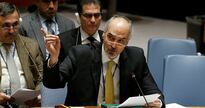
Syria’s envoy to the United Nations warned Tuesday that if the world body did not halt Israeli strikes on his country, Syria would retaliate with an attack on Ben Gurion International Airport outside Tel Aviv.
Speaking at the UN Security Council after a series of Israeli airstrikes on Sunday and Monday, Bashar Jaafari said Israel was only able to act freely in Syria because it had the backing of the US, UK and France in the Security Council.
Syrian state media Sana quoted Jaafari as saying that if the UN Security Council didn’t adopt measures to stop Israel, “Syria would practice its legitimate right of self-defense and respond to the Israeli aggression on Damascus International Airport in the same way on the Tel Aviv airport.”
“Isn’t it time now for the UN Security council to stop the repeated Israeli aggressions on the Syrian Arab republic territories,” Jaafari said.
Israel has repeatedly hit targets inside Syria in recent years. Syria has rarely responded.
On Sunday, Israel reportedly conducted a missile attack on Iranian targets in Syria. Hours later, in the predawn hours of Monday morning, the Israeli occupation forces launched strikes on targets near Damascus and on the Syrian air defense forces.
Satellite images released by an Israeli firm on Tuesday appeared to show extensive damage at Damascus International Airport.
Twenty-one people were killed in the Israeli raids in Syria early on Monday, a Britain-based Syrian war monitor said earlier on Tuesday.
The Syrian Observatory for Human Rights initially reported the death toll from the Israeli strikes to be 11. But on Tuesday, the war monitor said the number had risen to 21, making it one of the deadliest attacks by Israel in Syria.
Syria warns of attack on Tel Aviv airport if UN fails to halt Israeli aggression
Syria has warned that it could use its right to respond in self defense to recent Israeli air raids against a civilian airport near Damascus by striking Tel Aviv’s Ben Gurion airport if the UN Security Council fails to shoulder its responsibilities and act against the regime’s aggression.
Syria’s UN Ambassador Bashar al-Ja’afari said on Tuesday that “the unlimited support” provided by some permanent members of the Security Council, namely France, Britain and the US, has encouraged Israel to continue its air raids on Syria, preventing the entire UN body from assuming its responsibilities.
Speaking at a UN Security Council meeting on the Middle East, Ja’afari said that if the 15-member body fails to adopt measures to stop Israel, Syria would practice its “legitimate right of self-defense” and retaliate against the regime's attacks.
“Isn’t time now for the UN Security council to stop the Israeli repeated aggressions on the Syrian Arab Republic territories?” he asked.
“Or is it required to draw the attention of the war-makers in this Council by exercising our legitimate right to defend ourself and respond to the Israeli aggression on Damascus International Civil Airport in the same way on Tel Aviv Airport?” he continued.
Earlier this week, Syria wrote protest letters to the United Nations, urging the world body to take a decisive step against Israel after the regime launched fresh air raids against targets near Damascus, including an airport.
Israel frequently attacks targets inside Syria in what is considered as an attempt to prop up Takfiri terrorist groups that have been suffering heavy defeats at the hands of Syrian government forces.
In a recent interview with The New York Times, Lieutenant General Gadi Eisenkot, the Israeli army’s outgoing chief of staff, said that the regime had carried out “thousands” of aerial assaults in Syria in recent years.
In a separate interview with The Sunday Times, he also confirmed long-running reports of Israel's collaboration with anti-Damascus militants, admitting that it had provided weapons to them.
Elsewhere in his remarks, Syria's UN envoy stressed his country's firm and non-negotiable right to wrest control over the occupied Golan Heights, urging Israel to completely withdraw from the region.
He further said that Israel's attempts to change the status in Golan were “doomed to failure”and would not affect Syria's sovereign right to the territory.
The Tel Aviv regime has for decades occupied and annexed Syria’s Golan Heights, a move never recognized by the international community.
Speaking at the UN Security Council after a series of Israeli airstrikes on Sunday and Monday, Bashar Jaafari said Israel was only able to act freely in Syria because it had the backing of the US, UK and France in the Security Council.
Syrian state media Sana quoted Jaafari as saying that if the UN Security Council didn’t adopt measures to stop Israel, “Syria would practice its legitimate right of self-defense and respond to the Israeli aggression on Damascus International Airport in the same way on the Tel Aviv airport.”
“Isn’t it time now for the UN Security council to stop the repeated Israeli aggressions on the Syrian Arab republic territories,” Jaafari said.
Israel has repeatedly hit targets inside Syria in recent years. Syria has rarely responded.
On Sunday, Israel reportedly conducted a missile attack on Iranian targets in Syria. Hours later, in the predawn hours of Monday morning, the Israeli occupation forces launched strikes on targets near Damascus and on the Syrian air defense forces.
Satellite images released by an Israeli firm on Tuesday appeared to show extensive damage at Damascus International Airport.
Twenty-one people were killed in the Israeli raids in Syria early on Monday, a Britain-based Syrian war monitor said earlier on Tuesday.
The Syrian Observatory for Human Rights initially reported the death toll from the Israeli strikes to be 11. But on Tuesday, the war monitor said the number had risen to 21, making it one of the deadliest attacks by Israel in Syria.
Syria warns of attack on Tel Aviv airport if UN fails to halt Israeli aggression
Syria has warned that it could use its right to respond in self defense to recent Israeli air raids against a civilian airport near Damascus by striking Tel Aviv’s Ben Gurion airport if the UN Security Council fails to shoulder its responsibilities and act against the regime’s aggression.
Syria’s UN Ambassador Bashar al-Ja’afari said on Tuesday that “the unlimited support” provided by some permanent members of the Security Council, namely France, Britain and the US, has encouraged Israel to continue its air raids on Syria, preventing the entire UN body from assuming its responsibilities.
Speaking at a UN Security Council meeting on the Middle East, Ja’afari said that if the 15-member body fails to adopt measures to stop Israel, Syria would practice its “legitimate right of self-defense” and retaliate against the regime's attacks.
“Isn’t time now for the UN Security council to stop the Israeli repeated aggressions on the Syrian Arab Republic territories?” he asked.
“Or is it required to draw the attention of the war-makers in this Council by exercising our legitimate right to defend ourself and respond to the Israeli aggression on Damascus International Civil Airport in the same way on Tel Aviv Airport?” he continued.
Earlier this week, Syria wrote protest letters to the United Nations, urging the world body to take a decisive step against Israel after the regime launched fresh air raids against targets near Damascus, including an airport.
Israel frequently attacks targets inside Syria in what is considered as an attempt to prop up Takfiri terrorist groups that have been suffering heavy defeats at the hands of Syrian government forces.
In a recent interview with The New York Times, Lieutenant General Gadi Eisenkot, the Israeli army’s outgoing chief of staff, said that the regime had carried out “thousands” of aerial assaults in Syria in recent years.
In a separate interview with The Sunday Times, he also confirmed long-running reports of Israel's collaboration with anti-Damascus militants, admitting that it had provided weapons to them.
Elsewhere in his remarks, Syria's UN envoy stressed his country's firm and non-negotiable right to wrest control over the occupied Golan Heights, urging Israel to completely withdraw from the region.
He further said that Israel's attempts to change the status in Golan were “doomed to failure”and would not affect Syria's sovereign right to the territory.
The Tel Aviv regime has for decades occupied and annexed Syria’s Golan Heights, a move never recognized by the international community.
22 jan 2019

IDF strike on Iranian targets in Syria, January 2019
Opinion: Just like last May, the IDF set up the Iranians in Syria with a well-laid plan to take out their military installations, but while it celebrates this achievement, it should also beware of unforeseen consequences.
Iran's Ra'ad was originally a medium-range rocket, upgraded and equipped with navigation and guidance systems. It comes from a family of upgraded rockets that are at the center of a determined campaign by Israel to prevent high quality munitions from reaching Hezbollah.
Sunday's rocket fire at Mount Hermon revealed the fact that the Iranians are apparently holding an arsenal of Ra'ads in Syria. And despite the bombing raids by the Israel Air Force, there remains the concern that some of these missiles may yet reach – or have already reached – their destination in Lebanon, which would lead to a fundamental change in the threat from the north. For while only one rocket was fired on Sunday, that was likely down to the limitations on this particular model and its truck-mounted launcher.
But the Iranians have again fallen into a well-hidden trap laid by Israel: The events of the past two days are an almost exact replica of Operation House of Cards from May 2018. In both cases, the Iranians tried to punish Israel for bombing Revolutionary Guards targets in Syria.
In Operation House of Cards, Israel tracked Iran's preparations to avenge the killing of Iranian soldiers at a Syrian airport on February 4, 2018. It took the Iranians three months to organize the plan, all the while under the watchful eye of Israel. And in early May, Israel carried out its preliminary attack at al-Kiswah base near Damascus, ostensibly to destroy missiles aimed at its territory.
After the attack, the Iranians had no option but to respond, launching rockets a few days later from the Damascus region towards the Golan Heights.
Israel had stage-managed this chain of events thanks to its intelligence. The Iranian rockets did not cause any damage, but did provide a pretext as well as legitimacy for what followed: Israel used its own response to the Iranian violation of its sovereignty to eliminate the bulk of Iran's military infrastructure in Syria in one fell swoop. The Iranians fell for Israel's poker face.
This sequence played out again over last two days: At the end of December, Israel reportedly attacked Damascus airport, killing a number of Iranian fighters. And in this instance too, the Iranians plotted their revenge under Israel's watchful eye, setting up a surface-to-surface missile in an autonomous Iranian area among Syrian bases in al-Kiswah.
On Sunday, just as in the first attack in May, the Israel Air Force struck the area. The Iranians, just as in the first attack in May, were pushed into a pre-planned response, firing their missile at Mount Hermon. Israel had predicted this response, and had an Iron Dome battery in place to shoot down the rocket. It also used this attack as an opportunity for "revenge". Just as in the first attack in May, the Syrians reported parallel air and surface-to-surface strikes on targets in Damascus, several hours later and under the cover of darkness.
Despite Israel's apparent control of the situation, a sense of failure could well make Qassem Suleimani, commander of the Quds Force in Syria, respond irrationally. The Iranians in Syria are at a disadvantage to Israel – and the only way it can harm Israel from Syria is through terrorism. Indeed, the rocket fire on Mount Hermon is a form of targeted terrorist attack, inasmuch as it was an attempt to kill as many Israelis as possible and to damage national morale. Iran can launch terror attacks from the Syrian border through its proxies or within Israel via Palestinian cells in Gaza and the West Bank. But here too, its infrastructure is capable of major impact.
Iran views terror attacks against Israeli targets abroad as problematic in light of its sensitive relations with European countries. But it could conduct an effective campaign against Israel from the Lebanese front through Hezbollah, or from Iran or western Iraq. Yet all of these options, in particular the Lebanon option, would be a declaration of war on Israel that a country like Lebanon simply cannot afford.
Opinion: Just like last May, the IDF set up the Iranians in Syria with a well-laid plan to take out their military installations, but while it celebrates this achievement, it should also beware of unforeseen consequences.
Iran's Ra'ad was originally a medium-range rocket, upgraded and equipped with navigation and guidance systems. It comes from a family of upgraded rockets that are at the center of a determined campaign by Israel to prevent high quality munitions from reaching Hezbollah.
Sunday's rocket fire at Mount Hermon revealed the fact that the Iranians are apparently holding an arsenal of Ra'ads in Syria. And despite the bombing raids by the Israel Air Force, there remains the concern that some of these missiles may yet reach – or have already reached – their destination in Lebanon, which would lead to a fundamental change in the threat from the north. For while only one rocket was fired on Sunday, that was likely down to the limitations on this particular model and its truck-mounted launcher.
But the Iranians have again fallen into a well-hidden trap laid by Israel: The events of the past two days are an almost exact replica of Operation House of Cards from May 2018. In both cases, the Iranians tried to punish Israel for bombing Revolutionary Guards targets in Syria.
In Operation House of Cards, Israel tracked Iran's preparations to avenge the killing of Iranian soldiers at a Syrian airport on February 4, 2018. It took the Iranians three months to organize the plan, all the while under the watchful eye of Israel. And in early May, Israel carried out its preliminary attack at al-Kiswah base near Damascus, ostensibly to destroy missiles aimed at its territory.
After the attack, the Iranians had no option but to respond, launching rockets a few days later from the Damascus region towards the Golan Heights.
Israel had stage-managed this chain of events thanks to its intelligence. The Iranian rockets did not cause any damage, but did provide a pretext as well as legitimacy for what followed: Israel used its own response to the Iranian violation of its sovereignty to eliminate the bulk of Iran's military infrastructure in Syria in one fell swoop. The Iranians fell for Israel's poker face.
This sequence played out again over last two days: At the end of December, Israel reportedly attacked Damascus airport, killing a number of Iranian fighters. And in this instance too, the Iranians plotted their revenge under Israel's watchful eye, setting up a surface-to-surface missile in an autonomous Iranian area among Syrian bases in al-Kiswah.
On Sunday, just as in the first attack in May, the Israel Air Force struck the area. The Iranians, just as in the first attack in May, were pushed into a pre-planned response, firing their missile at Mount Hermon. Israel had predicted this response, and had an Iron Dome battery in place to shoot down the rocket. It also used this attack as an opportunity for "revenge". Just as in the first attack in May, the Syrians reported parallel air and surface-to-surface strikes on targets in Damascus, several hours later and under the cover of darkness.
Despite Israel's apparent control of the situation, a sense of failure could well make Qassem Suleimani, commander of the Quds Force in Syria, respond irrationally. The Iranians in Syria are at a disadvantage to Israel – and the only way it can harm Israel from Syria is through terrorism. Indeed, the rocket fire on Mount Hermon is a form of targeted terrorist attack, inasmuch as it was an attempt to kill as many Israelis as possible and to damage national morale. Iran can launch terror attacks from the Syrian border through its proxies or within Israel via Palestinian cells in Gaza and the West Bank. But here too, its infrastructure is capable of major impact.
Iran views terror attacks against Israeli targets abroad as problematic in light of its sensitive relations with European countries. But it could conduct an effective campaign against Israel from the Lebanese front through Hezbollah, or from Iran or western Iraq. Yet all of these options, in particular the Lebanon option, would be a declaration of war on Israel that a country like Lebanon simply cannot afford.
21 jan 2019

The Israeli occupation forces at daybreak Monday said an overnight operation targeted the Quds Force of the Iranian Revolutionary Guards, as well as Syrian air defenses.
Syrian media said most of the Israeli missiles had been shot down.
Israel claimed it acted after the Quds Forces launched a rocket from Syria over the Golan Heights on Sunday.
The Israeli military also said that "dozens of Syrian surface-to-air missiles were launched, despite clear warnings to avoid such fire".
Syria's state-run Sana news agency quoted a military source as saying that the country's air defenses had shot down most of "hostile missiles".
Russia's defense control centre was quoted by Interfax news agency as saying that Syrian military air defenses destroyed more than 30 Israeli cruise missiles and guided bombs during the raids.
An attack targeting an airport in southeastern Damascus killed four Syrian soldiers and wounded six, the military centre was quoted by RIA news agency as saying on Monday,
The Syrian Observatory for Human Rights, a UK-based monitor, said the toll of the raids was 11.
Israeli Prime Minister Benjamin Netanyahu issued a warning during his visit to Chad on Sunday.
"We have a set policy, to target the Iranian entrenchment in Syria, and to harm whoever tried to harm us," he said.
Syrian media said most of the Israeli missiles had been shot down.
Israel claimed it acted after the Quds Forces launched a rocket from Syria over the Golan Heights on Sunday.
The Israeli military also said that "dozens of Syrian surface-to-air missiles were launched, despite clear warnings to avoid such fire".
Syria's state-run Sana news agency quoted a military source as saying that the country's air defenses had shot down most of "hostile missiles".
Russia's defense control centre was quoted by Interfax news agency as saying that Syrian military air defenses destroyed more than 30 Israeli cruise missiles and guided bombs during the raids.
An attack targeting an airport in southeastern Damascus killed four Syrian soldiers and wounded six, the military centre was quoted by RIA news agency as saying on Monday,
The Syrian Observatory for Human Rights, a UK-based monitor, said the toll of the raids was 11.
Israeli Prime Minister Benjamin Netanyahu issued a warning during his visit to Chad on Sunday.
"We have a set policy, to target the Iranian entrenchment in Syria, and to harm whoever tried to harm us," he said.
12 jan 2019
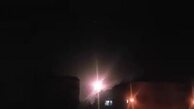
Syrian state news agency says Israeli jets hit ammunition warehouse at Damascus airport, adding most Israeli missiles intercepted by Syrian air defenses; Syrian Observatory says Israel also targeted Hezbollah missile deport in Al-Kiswah area.
Syrian air defenses intercepted missiles reportedly fired by Israeli fighter jets on Friday night, according to state news agency SANA, causing damage but no casualties.
SANA reported that "over eight targets" exploded over the capital of Damascus, saying Syrian air defenses intercepted most of the Israeli missiles.
An ammunition warehouse at the Damascus airport was reportedly hit, but a Syrian Transport Ministry official said to SANA airport activity continues as normal.
"At 11:15 before midnight Israeli warplanes coming from Al-Jalil area launched many missiles towards Damascus area and our air defenses intercepted them and downed most of them," a Syrian military source said to SANA.
Syrian state media broadcast footage of what it said were the air defenses firing, with bright lights seen shooting across the night sky. Explosions were heard in one of the videos.
The Syrian Observatory for Human Rights reported that the attack targeted missile depots that belong to Hezbollah in the Al-Kiswah area as well as the Damascus airport.
Hezbollah's Al-Manar TV said the attack was broader than usual, targeting areas ranging from the eastern Damascus suburb of Dmeir to Al-Kiswah south of capital all the way to the village of Dimas in the west near the Lebanon border. It also said Israeli fighter jets were also operating in Lebanese airspace.
Israel has mounted attacks in Syria as part of its effort to counter the influence carved out there by Iran, which has supported President Bashar Assad in the war that erupted in 2011.
The last Israeli attack reported by Syrian state media was on December 25, when a missile attack wounded three Syrian soldiers. It was the most extensive airstrike since a Russian intelligence plane was accidentally shot down during an Israeli strike.
An Israeli official said the air force had attacked several Iranian targets in three main locations. He said the targets were primarily storage and logistics facilities used by Iran to ship weapons to Hezbollah.
Russia criticized Israel's "provocative" strike, saying it directly threatened two civilian flights. Russia's Ministry of Defense, which did not specify which flights had been threatened, added that Syrian air defenses had destroyed 14 of 16 Israeli missiles launched by six F-16 jets against unspecified targets near Damascus.
Lebanon's acting Transport Minister Youssef Fenianos confirmed Russia's account, saying the two airplanes in Lebanese airspace "narrowly" escaped Israeli warplanes, averting a "human catastrophe." Fenianos said Lebanon will present a complaint to the UN Security Council.
Russia said the Syrian military didn't fully engage its air defense assets to avoid accidentally hitting the passenger jets, adding that Syrian air traffic controllers redirected the Damascus-bound plane to a Russian air base in Syria's coastal province of Latakia.
An Israeli official said it was Syrian air defenses that endangered the civilian planes, by firing 30 missiles in response to the airstrike. He also said that Iranian forces are operating less than 80 kilometers (50 miles) from the Israeli border, contrary to Russian assurances.
A senior Israeli official said in September Israel had carried out more than 200 attacks against Iranian targets in Syria in the last two years.
Syrian air defenses intercepted missiles reportedly fired by Israeli fighter jets on Friday night, according to state news agency SANA, causing damage but no casualties.
SANA reported that "over eight targets" exploded over the capital of Damascus, saying Syrian air defenses intercepted most of the Israeli missiles.
An ammunition warehouse at the Damascus airport was reportedly hit, but a Syrian Transport Ministry official said to SANA airport activity continues as normal.
"At 11:15 before midnight Israeli warplanes coming from Al-Jalil area launched many missiles towards Damascus area and our air defenses intercepted them and downed most of them," a Syrian military source said to SANA.
Syrian state media broadcast footage of what it said were the air defenses firing, with bright lights seen shooting across the night sky. Explosions were heard in one of the videos.
The Syrian Observatory for Human Rights reported that the attack targeted missile depots that belong to Hezbollah in the Al-Kiswah area as well as the Damascus airport.
Hezbollah's Al-Manar TV said the attack was broader than usual, targeting areas ranging from the eastern Damascus suburb of Dmeir to Al-Kiswah south of capital all the way to the village of Dimas in the west near the Lebanon border. It also said Israeli fighter jets were also operating in Lebanese airspace.
Israel has mounted attacks in Syria as part of its effort to counter the influence carved out there by Iran, which has supported President Bashar Assad in the war that erupted in 2011.
The last Israeli attack reported by Syrian state media was on December 25, when a missile attack wounded three Syrian soldiers. It was the most extensive airstrike since a Russian intelligence plane was accidentally shot down during an Israeli strike.
An Israeli official said the air force had attacked several Iranian targets in three main locations. He said the targets were primarily storage and logistics facilities used by Iran to ship weapons to Hezbollah.
Russia criticized Israel's "provocative" strike, saying it directly threatened two civilian flights. Russia's Ministry of Defense, which did not specify which flights had been threatened, added that Syrian air defenses had destroyed 14 of 16 Israeli missiles launched by six F-16 jets against unspecified targets near Damascus.
Lebanon's acting Transport Minister Youssef Fenianos confirmed Russia's account, saying the two airplanes in Lebanese airspace "narrowly" escaped Israeli warplanes, averting a "human catastrophe." Fenianos said Lebanon will present a complaint to the UN Security Council.
Russia said the Syrian military didn't fully engage its air defense assets to avoid accidentally hitting the passenger jets, adding that Syrian air traffic controllers redirected the Damascus-bound plane to a Russian air base in Syria's coastal province of Latakia.
An Israeli official said it was Syrian air defenses that endangered the civilian planes, by firing 30 missiles in response to the airstrike. He also said that Iranian forces are operating less than 80 kilometers (50 miles) from the Israeli border, contrary to Russian assurances.
A senior Israeli official said in September Israel had carried out more than 200 attacks against Iranian targets in Syria in the last two years.

The Syrian state news agency said Israeli warplanes fired a number of missiles toward the Damascus area Friday, triggering Syrian air defenses that shot down most of them.
“The results of the aggression so far were limited to a strike on one of the warehouses at Damascus airport,” the SANA news agency cited a military source.
The attack took place at 11:15 p.m. local time, SANA said, adding that the fighter jets attacked from the Galilee in northern Israel.
It also quoted a transport ministry source as saying that the airport was running normally.
Syrian state media broadcast footage of what it said were the air defenses firing, with bright lights seen shooting across the night sky. Explosions were heard in one of the videos.
Hezbollah's al-Manar TV said the attack was broader than usual, targeting areas ranging from the eastern Damascus suburb of Dmeir to Kiswa south of the capital all the way to the village of Dimas in the west near the Lebanon border.
For its part, the Britain-based Syrian Observatory for Human Rights said the airstrikes targeted an area near the airport while others hit the area of Kiswa, which is home to positions and storage sites for Iranian and Hezbollah forces allied with Syria's government.
There was no immediate word from Israel, which rarely comments on such attacks. Israel is widely believed to have been behind a series of airstrikes in Syria that have mainly targeted Iranian and Hezbollah forces and military sites.
“The results of the aggression so far were limited to a strike on one of the warehouses at Damascus airport,” the SANA news agency cited a military source.
The attack took place at 11:15 p.m. local time, SANA said, adding that the fighter jets attacked from the Galilee in northern Israel.
It also quoted a transport ministry source as saying that the airport was running normally.
Syrian state media broadcast footage of what it said were the air defenses firing, with bright lights seen shooting across the night sky. Explosions were heard in one of the videos.
Hezbollah's al-Manar TV said the attack was broader than usual, targeting areas ranging from the eastern Damascus suburb of Dmeir to Kiswa south of the capital all the way to the village of Dimas in the west near the Lebanon border.
For its part, the Britain-based Syrian Observatory for Human Rights said the airstrikes targeted an area near the airport while others hit the area of Kiswa, which is home to positions and storage sites for Iranian and Hezbollah forces allied with Syria's government.
There was no immediate word from Israel, which rarely comments on such attacks. Israel is widely believed to have been behind a series of airstrikes in Syria that have mainly targeted Iranian and Hezbollah forces and military sites.
6 jan 2019
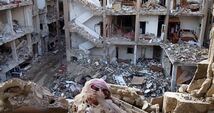
The Action Group for the Palestinians of Syria (AGPS) slammed the Syrian authorities for preventing Yarmouk residents from removing dead bodies stranded beneath the mounds of debris piled up in the warfare.
AGPS urged the international human rights institutions to immediately step in and pressurize the Syrian government to green-light taking out Palestinian dead bodies from underneath the debris.
According to AGPS data, over 80 cadavers have been left under the mounds of rubble into which civilian homes have been turned in government offensives on the camp.
The list reportedly includes bodies of civilians and ISIS gunmen who were hiding in the area.
The Syrian security forces obstructed the work of Palestinian Red Crescent staff members who attempted to get into the area and pull the dead bodies.
The Syrian authorities claimed the ban comes on account that the cadavers’ identities remain unknown and that none of their relatives has showed up in the area.
Over recent months, tension has been running high in the area after pro-government militias in Syria figured in pictures and videos while stealing civilian property and looting homes in Yarmouk Camp.
A military offensive launched by the Syrian government forces and their Russian abettors in April 2018 led to the government takeover of Yarmouk Camp and other ISIS-held zones south of Damascus.
AGPS urged the international human rights institutions to immediately step in and pressurize the Syrian government to green-light taking out Palestinian dead bodies from underneath the debris.
According to AGPS data, over 80 cadavers have been left under the mounds of rubble into which civilian homes have been turned in government offensives on the camp.
The list reportedly includes bodies of civilians and ISIS gunmen who were hiding in the area.
The Syrian security forces obstructed the work of Palestinian Red Crescent staff members who attempted to get into the area and pull the dead bodies.
The Syrian authorities claimed the ban comes on account that the cadavers’ identities remain unknown and that none of their relatives has showed up in the area.
Over recent months, tension has been running high in the area after pro-government militias in Syria figured in pictures and videos while stealing civilian property and looting homes in Yarmouk Camp.
A military offensive launched by the Syrian government forces and their Russian abettors in April 2018 led to the government takeover of Yarmouk Camp and other ISIS-held zones south of Damascus.
Page: 2 - 1
